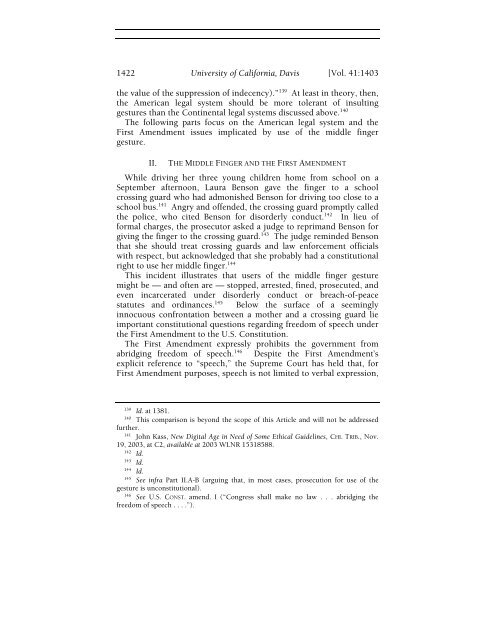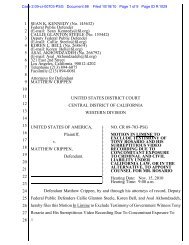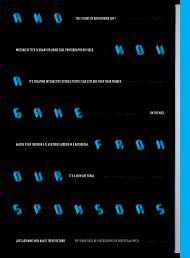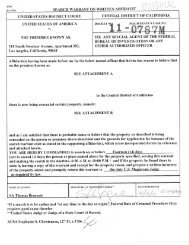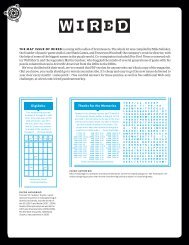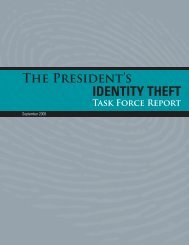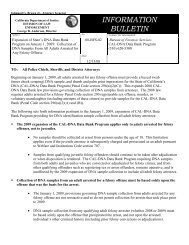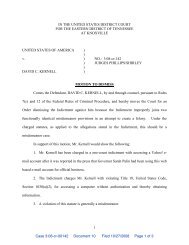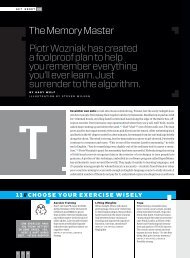Digitus Impudicus: The Middle Finger and the Law - Wired
Digitus Impudicus: The Middle Finger and the Law - Wired
Digitus Impudicus: The Middle Finger and the Law - Wired
You also want an ePaper? Increase the reach of your titles
YUMPU automatically turns print PDFs into web optimized ePapers that Google loves.
1422 University of California, Davis [Vol. 41:1403<br />
<strong>the</strong> value of <strong>the</strong> suppression of indecency).” 139 At least in <strong>the</strong>ory, <strong>the</strong>n,<br />
<strong>the</strong> American legal system should be more tolerant of insulting<br />
gestures than <strong>the</strong> Continental legal systems discussed above. 140<br />
<strong>The</strong> following parts focus on <strong>the</strong> American legal system <strong>and</strong> <strong>the</strong><br />
First Amendment issues implicated by use of <strong>the</strong> middle finger<br />
gesture.<br />
II. THE MIDDLE FINGER AND THE FIRST AMENDMENT<br />
While driving her three young children home from school on a<br />
September afternoon, Laura Benson gave <strong>the</strong> finger to a school<br />
crossing guard who had admonished Benson for driving too close to a<br />
school bus. 141 Angry <strong>and</strong> offended, <strong>the</strong> crossing guard promptly called<br />
<strong>the</strong> police, who cited Benson for disorderly conduct. 142 In lieu of<br />
formal charges, <strong>the</strong> prosecutor asked a judge to reprim<strong>and</strong> Benson for<br />
giving <strong>the</strong> finger to <strong>the</strong> crossing guard. 143 <strong>The</strong> judge reminded Benson<br />
that she should treat crossing guards <strong>and</strong> law enforcement officials<br />
with respect, but acknowledged that she probably had a constitutional<br />
right to use her middle finger. 144<br />
This incident illustrates that users of <strong>the</strong> middle finger gesture<br />
might be — <strong>and</strong> often are — stopped, arrested, fined, prosecuted, <strong>and</strong><br />
even incarcerated under disorderly conduct or breach-of-peace<br />
statutes <strong>and</strong> ordinances. 145 Below <strong>the</strong> surface of a seemingly<br />
innocuous confrontation between a mo<strong>the</strong>r <strong>and</strong> a crossing guard lie<br />
important constitutional questions regarding freedom of speech under<br />
<strong>the</strong> First Amendment to <strong>the</strong> U.S. Constitution.<br />
<strong>The</strong> First Amendment expressly prohibits <strong>the</strong> government from<br />
abridging freedom of speech. 146 Despite <strong>the</strong> First Amendment’s<br />
explicit reference to “speech,” <strong>the</strong> Supreme Court has held that, for<br />
First Amendment purposes, speech is not limited to verbal expression,<br />
139 Id. at 1381.<br />
140 This comparison is beyond <strong>the</strong> scope of this Article <strong>and</strong> will not be addressed<br />
fur<strong>the</strong>r.<br />
141 John Kass, New Digital Age in Need of Some Ethical Guidelines, CHI. TRIB., Nov.<br />
19, 2003, at C2, available at 2003 WLNR 15318588.<br />
142 Id.<br />
143 Id.<br />
144 Id.<br />
145 See infra Part II.A-B (arguing that, in most cases, prosecution for use of <strong>the</strong><br />
gesture is unconstitutional).<br />
146 See U.S. CONST. amend. I (“Congress shall make no law . . . abridging <strong>the</strong><br />
freedom of speech . . . .”).


